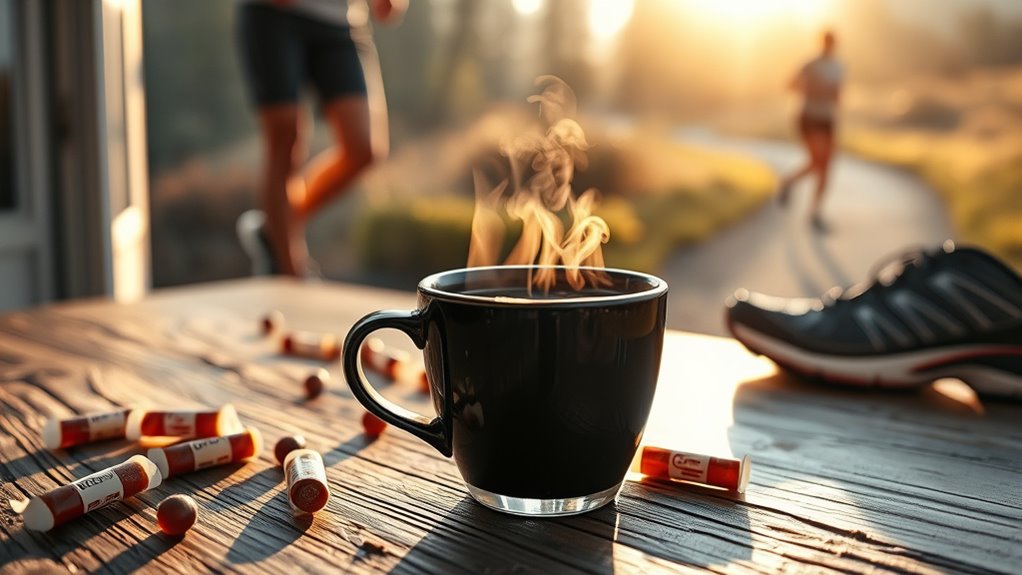Yes, coffee can help your sports performance by boosting endurance, strength, and alertness. Caffeine, found in coffee, blocks adenosine receptors in your brain, increasing adrenaline and blood flow. This helps you push through fatigue, sustain higher effort, and recover faster. It benefits both endurance and high-intensity activities, making you feel stronger and more focused. If you want to discover how to maximize these effects safely, keep exploring what science says.
Key Takeaways
- Caffeine from coffee improves endurance and high-intensity exercise performance by increasing adrenaline and reducing perceived effort.
- It enhances both aerobic and anaerobic activities, benefiting runners, cyclists, weightlifters, and team sport athletes.
- Coffee’s caffeine content can extend effort duration, delay fatigue, and support sustained performance during long workouts.
- It boosts muscle output and explosive movements, aiding strength training and team sports requiring quick sprints.
- Coffee may also reduce exercise-related muscle pain and help with faster recovery post-activity.

Have you ever wondered how coffee can boost your sports performance? The answer lies in caffeine‘s proven ability to enhance both endurance and high-intensity activities. When you consume moderate to high doses—about 5 to 9 milligrams per kilogram of your body weight—caffeine can markedly improve your athletic output. It works primarily by blocking adenosine receptors in your brain, which leads to increased adrenaline levels. This boost in adrenaline results in better blood flow to your muscles and heart, more energy production, and heightened alertness.
No matter your fitness level, whether you’re a seasoned athlete or just starting out, caffeine can offer benefits. Both trained individuals and those who are sedentary have shown performance improvements after caffeine intake.
Caffeine’s effects are versatile, benefiting a wide range of exercise types. Whether you’re engaging in aerobic activities like running, cycling, and rowing, or anaerobic efforts such as sprinting or weightlifting, caffeine can give you an edge. It’s equally effective whether you’re drinking coffee or taking caffeine supplements.
Studies support the idea that caffeine enhances endurance by increasing your capacity and improving your time-trial performance. During long-duration activities, caffeine helps you push through fatigue by reducing how hard you feel the effort. This means that your perceived exertion drops, making the activity feel less strenuous, even if you’re working just as hard.
This is particularly advantageous in endurance sports like marathons or extended cycling races, where sustained effort is essential.
Caffeine isn’t just about endurance; it also plays a crucial role in high-intensity and strength-based exercises. It boosts your ability to generate maximal muscle output, which is essential for explosive movements, strength training, and team sports like basketball or football.
During these short bursts of intense effort, caffeine can increase your physicality, helping you draw fouls, overpower opponents, or perform rapid sprints more effectively. Many athletes also report feeling stronger and more capable mentally and physically during high-intensity activities when they consume caffeine beforehand.
Another notable benefit is caffeine’s potential to reduce muscle pain during exercise. This pain reduction can help you maintain higher intensity levels and possibly recover faster afterward.
By lowering perceived effort and discomfort, caffeine encourages you to work harder and stick with your training longer. While research on recovery is still evolving, the pain-relief aspect can translate into better performance during training and competitions.
Frequently Asked Questions
How Much Coffee Is Safe to Consume Before Exercise?
You should aim to consume about 1 to 2 cups of coffee, providing roughly 100-200 mg of caffeine, roughly 45-60 minutes before exercise.
This timing guarantees peak effectiveness without risking side effects like dehydration or jitters.
Remember, individual tolerance varies, so start with lower amounts and adjust based on your response.
Stay mindful of your body’s signals to enjoy caffeine’s benefits safely during your workout.
Does Caffeine Affect All Sports Equally?
You wonder if caffeine impacts all sports equally. It generally offers benefits across various activities, but its effects are more pronounced in endurance sports, helping you reduce fatigue and sustain effort longer.
In high-intensity team sports, it boosts physical performance and focus but doesn’t improve sport-specific skills like accuracy.
Your individual response varies, so while caffeine can help many athletes, it mightn’t work the same for everyone or in every sport.
Can Coffee Improve Endurance or Only Short Bursts?
Imagine you’re pushing through a long run, feeling your energy fade—then caffeine kicks in, revitalizing you. Coffee can boost endurance by increasing stamina, VO2 max, and blood flow, helping you sustain effort longer.
While it’s less effective for short bursts, its benefits shine during prolonged activity. So, if you’re facing a marathon or extended workout, coffee could be your secret weapon for endurance, not just quick sprints.
Are There Any Long-Term Health Risks From Coffee for Athletes?
You might wonder if coffee poses long-term health risks for athletes. Regular caffeine intake from coffee can increase heart rate, blood pressure, and the risk of cardiovascular issues over time. It may also lead to ECG abnormalities, hypertension, and thrombosis.
Young athletes are especially vulnerable, and energy drinks with high caffeine levels amplify these risks. While more research is needed, moderation and awareness are key to minimizing potential long-term health concerns.
How Does Coffee Interact With Sports Supplements?
You might wonder if coffee interacts with sports supplements, and the answer’s not straightforward. Caffeine in coffee can boost endurance and power, but it may also amplify side effects when combined with other stimulants.
Always be cautious about mixing, as interactions aren’t fully understood. Listen to your body, stick within recommended doses, and consult a healthcare professional if you’re unsure.
Combining wisely can help optimize your performance safely.
Conclusion
So, if you’re looking to boost your energy, sharpen your focus, and enhance your endurance, coffee might just be your secret weapon. It’s about more than just waking up; it’s about waking up your performance. It’s about fueling your body, fueling your mind, and fueling your passion. Embrace the potential of coffee, harness its power, and let it help you push your limits, improve your game, and reach your goals.









